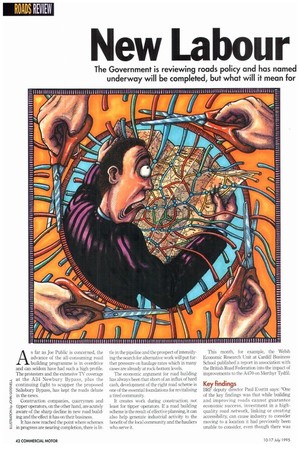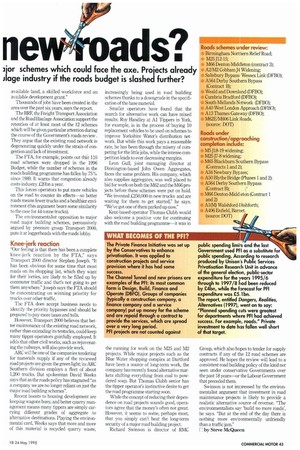New Labour
Page 44

Page 45

If you've noticed an error in this article please click here to report it so we can fix it.
As far as Joe Public is concerned, the advance of the all-consuming road building programme is in overdrive and can seldom have had such a high profile. The protesters and the extensive TV coverage at the A34 Newbury Bypass, plus the continuing fight to scupper the proposed Salisbury Bypass, has kept the roads debate in the news.
Construction companies, quarrymen and tipper operators, on the other hand, are acutely aware of the sharp decline in new road building and the effect it has on their business.
It has now reached the point where schemes in progress are nearing completion, there is lit tle in the pipeline and the prospect of intensifying the search for alternative work will put further pressure on haulage rates which in many cases are already at rock-bottom levels.
The economic argument for road building has always been that short of an influx of hard cash, development of the right road scheme is one of the essential foundations for revitalising a tired community It creates work during construction; not least for tipper operators If a road building scheme is the result, of effective planning, it can also help generate industrial activity to the benefit of the local community and the hauliers who serve it. This month, for example, the Welsh Economic Research Unit at Cardiff Business School published a report in association with the British Road Federation into the impact of improvements to the A470 on Merthyr Tydfil.
Key findings
BRI. deputy director Paul Everitt says; "One of the key findings was that while building and improving roads cannot guarantee economic success, investment in a highquality road network, linking or creating accessibility, can cause industry to consider moving to a location it had previously been unable to consider, even though there was available land, a skilled workforce and an available development grant:' Thousands of jobs have been created in the area over the past six years, says the report.
The BRF, the Freight Transport Association and the Road Haulage Association support the retention of at least most of the 12 schemes which will be given particular attention during the course of the Government's roads review. They argue that the existing road network is degenerating quickly under the strain of congestion and lack of investment.
The PTA, for example, points out thit 110 road schemes were dropped in the 1996 Budget, while the number of schemes in the roads building programme has fallen by 75% since 1989. It warns that congestion already costs industry £20bn a year.
This forces operators to put more vehicles on the road to counter its effects—so better roads means fewer trucks and a healthier environment (this argument bears some similarity to the case for 44-tonne trucks).
The environmentalist opposition to major road major building schemes, persuasively argued by pressure group Transport 2000, puts it at loggerheads with the roads lobby.
Knee-jerk reaction
"Our feeling is that there has been a complete knee-jerk reaction by the FTA," says Transport 2000 director Stephen Joseph. "It has been obvious for some time that most roads on its shopping list, which they want for their lorries, are likely to be filled up by commuter traffic and that's not going to get them anywhere." Joseph says the FTA should be concentrating on winning priority for trucks over other traffic.
The VIA does accept business needs to identify the priority bypasses and should be prepared to pay more taxes and tolls.
However, Transport 2000 believes that better maintenance of the existing road network, rather than extending its tentacles, could keep many tipper operators gainfully employed. It adds that other civil works, such as rejuvenating the railways, will also provide work.
ARC will be one of the companies tendering for materials supply if any of the reviewed road projects are given the green light; its ARC Southern division employs a fleet of about 1,200 trucks. But spokesman David Weeks says that as the roads policy has stagnated "as a company we are no longer reliant on just the major road building schemes".
Recent boosts to housing development are keeping wagons busy, and better quarry management means many tippers are simply carrying different grades of aggregate to alternative destinations. Playing the environmental card, Weeks says that more and more of this material is recycled quarry waste, increasingly being used in road building schemes thanks to a downgrade in the specification of the base material.
Smaller operators have found that the search for alternative work can have mixed results. Roy Handley at Al Tippers in York, for example, is in the process of buying 10 replacement vehicles to be used on schemes to improve Yorkshire Water's distribution network. But while this work pays a reasonable rate, he has been through the misery of competing for the little jobs, while the intense competition leads to ever decreasing margins.
Leon Gull, joint managing director at Dinnington-based John Owen Aggregates, faces the same problem. His company, which also supplies aggregates, was well placed to bid for work on both the M62 and the M66 projects before these schemes were put on hold. "We invested £250,000 in new trucks and are waiting for them to get started," he says. "We've got one of them parked up now" Kent-based operator Thomas Clubb would also welcome a positive vote for continuing with the road building programme—it was in the running for work on the M25 and M2 projects. While major projects such as the Blue Water shopping complex at Dartford have been a source of long-term work, the company has recently found alternative markets shifting everything from coal to powdered soap. But Thomas Clubb senior has the tipper operator's instinctive desire to get the road programme starting soon.
While the concept of reducing their dependence on road projects sounds good, operators agree that the money's often not great However, it seems to some, perhaps most, that you simply can't beat the long-term security of a major road building project.
Richard Svvinson is director of RMC Group, which also hopes to tender for supply contracts if any of the 12 road schemes are approved. He hopes the review will lead to a consistent road building policy of the kind not seen under conservative Governments over the past 18 years—or the Labour Government that preceded them.
Swinson is not impressed by the environmentalist argument that investment in mad maintenance projects is likely to provide a realistic alternative source of revenue. "The environmentalists say 'build no more roads', he says. "But at the end of the day there is nothing more environmentally unfriendly than a traffic jam."
IT by Steve McQueen








































































































